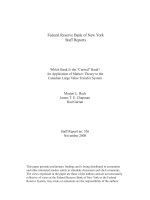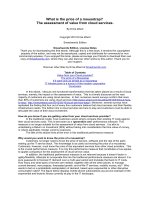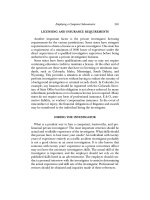Organization culture
Bạn đang xem bản rút gọn của tài liệu. Xem và tải ngay bản đầy đủ của tài liệu tại đây (925.67 KB, 36 trang )
ORGANIZATIONAL BEHAVIOR
ORGANIZATIONAL CULTURE IN FAMILY FIRMS
Instructor: Dr. Anna Lin
Presenters:
1. Joey
2. Danny
3. Eden
4. Jason
Agenda
01
1. Organizational Culture in Family Firms
02
2. Characteristics of Organizational culture in Family Firms
03
2. Definition of organizational culture and family company
3. How organizational culture affects performance
04
4. Creating and sustaining culture, how employees learn culture
05
5. Applying in real life
ORGANIZATIONAL CULTURE IN
FAMILY COMPANY
Definition of the Family Company
The majority of decision-making rights are in
the possession of the natural person(s) who
established the firm
01
02
The majority of decisionmaking rights are indirect
or direct.
/>
03
At least one representative of the
family or kin is formally involved in the
governance of the firm.
Definition of organizational culture
Organizational culture is the set of beliefs, expectations and basic principles
shared by the members of an organization (Schein,1995).
Organizational culture refers to a system of shared meaning held by members
that distinguishes the organization from other organizations. Seven primary
characteristics capture the essence of an organization’s culture, they are
Innovation and risk taking, Attention to detail, Outcome orientation, People
orientation, Team orientation, Aggressiveness, Stability.
Organizational culture is greater importance in the sphere of the family firm, where
a set of values, beliefs and interests, highly influenced by the family relations, may
produce significant differences from any other non-family organizations (Dyer,
1986, Barontini and Caprio, 2006).
CHARACTERISTICS
Characterized by low investments in innovation, limited productivity, and reduced
international orientation (Monreal-Pérez & Sánchez-Marín, 2017).
Family firms create value through product, process, and service innovations that fuel
growth and lead to prosperity.
The long-term nature of family firms’ ownership allows them to dedicate the resources
required for innovation and risk taking, thereby fostering entrepreneurship.
Conservative, unwilling or unable to take the risks associated with. Conservative
strategies as a result of their organizational cultures (Dertouzos et al., 1989)
16-7
The Change Masters: Innovations for productivity in the
American corporation. Kanter, R.M. (1983).
The trend toward decentralized organizations makes culture more important
than ever, but also makes establishing a strong culture more difficult.
Centralization places power in the hands of a few select people and may stifle
entrepreneurship by inducing rigidity within the family firm’s structure, make it
difficult for employees to gain the support needed for their ventures.
In contrast, organizational cultures that accept and encourage legitimate,
decentralized authority and coordination of effort will enhance flexibility and
promote the independent contributions of their members (e.g., Kanter, 1983).
Long term
perspective
Stable leadership
Strong identity
The Strength of Culture in a Family Business
Care more about the longer
term value of the brand and
creating a sustainable legacy
Foster closer contact with
management within the organization
Display a greater aversion for risk
Culture in family-owned firms is difficult to replicate and so may be a source of strategic advantage.
/>
The Founders of Organization
[1] Sharma, P.: An Overview of the Field of Family Business Studies: Current Status and Directions for the
Future. Family Business Review, Vol. 17, No. 1, str. 1-36, 2004
[2] Denison, D., Lief, C., Ward, J. L.: Culture in Family-Owned Enterprises, Recognizing and Leveraging Unique
Strengths. Family Business Review, Vol. 17, No. 1, 61-70, 2004
The distinct background and character of
entrepreneurs led them to establish cultures
that were not only rich in core values and
performance-enhancing behaviors, but also
commercial environments conducive to
learning and encouraging flexibility.
Sharma [1] expose the influential role of
family businesses' founders; due to their
long tenures and the centrality of their
position in their family and firm, founders
exert considerable influence of the culture,
values and performance of their firms
during and beyond their tenure.
Denison, Lief and Ward [2] believe that the
continuity of the founder's values in the
company's culture could explain that
family businesses have a distinct,
performance-enhancing culture.
Culture Creates Climate and Innovation
Organizational climate is shared
perceptions and attitudes about
the organization and work
environment.
The most innovative companies
have open, unconventional,
collaborative, vision-driven, and
accelerating cultures.
In family businesses, creating fit among
organizational climate and values and
family objectives is very significant in
resolving the paradox in family firm
innovation, unlocking the innovation
potential of family firms, and letting them
gain competitive advantage (De Massis
et al., 2015)
Gibson and Birkinshaw (2004) claims
family firms are often characterized by a
risk-averse organizational climates that
permeates their decisions in product
innovation, whereas nonfamily enterprises
are predominantly risk taking
1. De Massis, A., Di Minin, A., & Frattini, F. (2015). Family-driven innovation: Resolving the paradox in family firms. California Management Review, 58(1), 5–19. doi:10.1525/cmr.2015.58.1.5
HOW CULTURE AFFECTS PERFORMANCE
Performance of family firms: A literature review and guidance for future research
By Joseph H. Astrachan, Kennesaw* and Thomas Zellweger, St. Gallen
Luhmann (1968)
Steier (2001)
Trust between family
members represents an
important source of
strategic advantage,
since trust-based
relationships serve to
reduce complexity and
transaction costs.
Golembiewski,
McConkie (1988) Mayer
et al (1995) Dirks (1999)
Trust has been
considered as a variable
that has positive effects
on work group process
and performance,
through higher levels of
cooperation and joint
efforts.
Rosenthal & Masarech
(2003)
Organizational culture is
linked to firm
performance
Chami, Fullenkamp
(2002) De Paola, Scoppa
(2001) Randoy, Nielsen
(2002)
Altruism within the
family could lead to
superior employment
contracts by reducing the
necessity of excessive
monitoring and
incentives-based pay,
and by offering credible
threat of sanctions from
other family members.
Culture in Family-Owned Enterprises: Recognizing and Leveraging Unique Strengths
Daniel Denison - Colleen Lief - John L. Ward (2004)
Corporate culture in family businesses is unique and could be a
distinct competitive advantage. The more indices culture traits
have, the more competitive advantages that Family - culture get.
A family firm’s culture can be operationally described, and
related to company performance.
A thorough understanding of an organization’s cultural
character may be management’s last, best weapon.
Nurtured and translated into strategic and financial benefit.
The Denison Organizational Culture Model
(Denison, 1990; Denison & Mishra, 1995; Denison & Neale, 1996)
Denison used the model to described the relationship organizational culture that is linked to
company performance to explore the relative advantages of family business culture.
Entrepreneurship in Family vs. Non-Family Firms:
A Resource Based Analysis of the Effect of Organizational Culture
Shaker A. Zahra - James C. Hayton - Carlo Salvato/ Baylor University – USA (2003)
DIMENSIONS
Individual vs Group
orientation
Internal vs External
orientation
Hypothesis 1: Moderate levels
of individualism
The
centralization/decentralization
of coordination and control
Hypothesis 2: High external
cultural orientation
Short- vs long-term
orientation
Hypothesis 3: Cultural
orientation toward
decentralization
Hypothesis 4:
Emphasis on
financial controls
Hypothesis 6: The association between the four cultural dimensions and entrepreneurship Hypothesis 5:
Strategic controls
will be stronger for family firms than non-family firms.
Entrepreneurship in Family vs. Non-Family Firms:
A Resource Based Analysis of the Effect of Organizational Culture
Shaker A. Zahra - James C. Hayton - Carlo Salvato/ Baylor University – USA (2003)
Moderate levels of
individualism
H1+
High external cultural
orientation
Acultural orientation
toward
decentralization
Financial controls
H1+
H1+
Entrepreneurship in family
firms
H1H1+
Strategic controls
The influence of Family Culture on performance of Family Business: An empirical study
Mohd Abass Bhat – Javeed Ahmad Shah – India
Data for collection has been selected from 150 family businesses of Ujjain district of (M.P) India.
Understand that they
are part of the families
and are proud of their
business
Family managers
clear understand and
support for strategic
decisions
Common value
system for Family
business
Discussion with
employees, friends
and family members in
the family business
Extraordinary effort by
family members
Performance
Member’s
commitment, loyalty
and pride toward
family business.
Innovative culture, management control systems and performance in small and mediumsized Spanish family firms
Antonio Duréndez*, Antonia Madrid-Guijarro** & Domingo García-Pérez-de-Lema – Technical University of Cartagena - Spain
+
+
-
Performance
in family firms
Creating and sustaining culture
Creating and sustaining culture
Family firm culture is internally group oriented, based on emotional and personalist values.
(Gregorio Sánchez Marín et.al, 2016)
Founder’s philosophy
Individuals with the same way of
Selection
thinking and feeling
Through words, behaviorTop managementEstablish norms, belief
Socialization to employees
Induction, orientation program
Companies’ core values
Creating and sustaining culture - IKEA
Cost-consciousness
Shaping
organizational
culture in IKEA
SimplicityIngvar KampradEfficiency
IKEA’s recipe:
selling good-quality
practical furniture at
cheap prices
Creating and sustaining culture - THP
8 core values
Put customer satisfaction first
Adhere to international quality standards
Behave responsibly toward your community and society
Believe that nothing is impossible
Dare to think differently in conquering challenging goals
Keep the spirit of entrepreneurship alive
Maintain a forward-looking mindset
Act with integrity
Overall essence of
Organizational culture:
Aggressive
4 main types of culture in family business
(W. Gibb Dyer, Jr. of The Family Firm Institute)
• Decision an be made quickly
by family leader
• Employees are expected to
do as they are told
• Bring in outside employees
• Emphasis on efficiency,
employees make changes to
improve efficiency
• Employees are trusted
with more decisionmaking responsibilities
Paternalistic
Laissez-Faire
Professional
Participative
• Family members and employees
collaborate on solutions and make
decisions.
• Employees’ innovation, morale and
creativity are high
How employees learn culture
How employees learn culture
Stories
Rituals
Symbols
• Anchoring the present in the past and legitimating current practices
• Include narratives about the organization’s founders, rule breaking,
rags-to-riches successes, workforce reductions, relocations of
employees, reactions to past mistakes, and organizational coping
• Repetitive sequences of activities that express and reinforce the key
values of the organization
• Layout of corporate headquarter, the size of offices, the elegance of
furnishings, perks, and attire.









